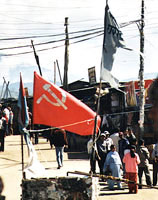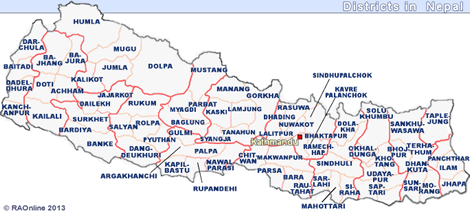Rolpa:
RNA blamed Maoists for taking alcohol, drugs prior to attacks
|
|
July
2002
|
|
Maoist
rebels have been involving their fighters in attacks not only with the
use of arms and ammunitions but also with alcoholic substances, narcotic
drugs that boost mental excitement in order to make their attacks successful.
|
Royal
Nepal Army (RNA) in Khara in Rolpa district claims that they have found
evidences of excessive use of alcohol and drugs by the Maoists while launching
attacks on the Khara company of the army. "About 8,000 combat fighters
of Maoist rebels had come for Khara attack. Most of them had come for the
attack in alcoholic stupor after drinking wine," an army officer said."
Army personell found gallons and gallons of wines, quarter bottles of rum
from the dead rebels, medicines in small rubber bottles, syringes with
drugs, and condoms in pockets of each."
top
Khara
attack on may 2002: More details
|
|
July
2002
|
|
About
8, 000 armed terrorists army had launched an attack on the temporary camp
of the Royal Nepal Army at Khara on the night of May 27, 2002. Five RNA
soldiers had been killed in the attack. More than 300 rebels including
the commander were shot down and more than one thousand were injured by
the army, official sources reported.
|
The
RNA battalion at Khara has been based in a camp on a high hillock with
slopes all around for construction of Salyan-Musikot road and for maintaining
law and order. The battalion commander said that they have received information
that the terrorists have planned to attack again in the fourth week of
July.
"As
the Maoist forces in Rukum have been gradually destroyed, their forces
are inadequate. Therefore, they can launch an unsuccessful attack in any
one place bybringing
guerrilla personell from outside, but they can't launch attacks in two
or more places simultaneously. " the commander said. The army has disclosed
that the Maoist forces have moved ahead their plan of attack in Rukum with
the help of 38 platoons of armed militia including five platoons of hard
core fighters from Rukum and additional 33 platoons from outside. One platoon
usually has 38 to 42 guerrillas.
The
army also informed that the Maoists have been giving military training
to the new ones and political training to the old ones focusing on Rukum,
Jajarkot, Salyan and Rolpa districts.
"The
Maoists have now been engaged in collecting foodgrains and organisational
extension by threatening the helpless people and recruiting and giving
training to new persons and ex-armies, forcefully extorting money and kidnapping.
The terrorists have continued destruction of physical infrastructure and
looting even after the imposition of emergency in the country", the commander
added.
top
Maoist
leader renews dialogue call
|
|
July
2002
|
|
Maoist
rebels in Nepal have renewed the call for a resumption of dialogue
with the government. But they have given no indication of agreeing to the
government's condition that they must give up arms before the dialogue.
|
The
Maoist's fresh appeal for peace talks comes several months ahead of parliamentary
elections in the country.
The
Maoist Communist Party's leader Prachanda called for a positive political
solution to end the long-running insurgency in Nepal. The Maoist rebels
have several times repeated the call for resumption of dialogue. The goverment
has ruled out talks unless the rebels laid down arms.
top
India
ready to act against Maoists
|
|
July
2002
|
|
According
to the Indian ambassador to Nepal, the Indian government would take immediate
action against the senior Maoist leaders provided that the Nepal government
informs the latter about their shelters in India.
|
The
Indian government would immediately arrest them (senior Maoist leaders)
if the Nepal government provides information about their hideouts. The
ambassador said that some leaders of Nepal's political parties, including
opposition leaders, might have authentic information about the Maoist leaders
hiding in India. Some of the party leaders have met with the Maoist leaders
in India, Indian intelligence sources said. An Indian intelligence department
is closely monitoring leaders of the banned organisation. The Indian government
is going to deploy Special Service Bureau along the Nepal-India border
with a view to controlling Maoist terrorism and other forms of criminal
activities.
top
|



